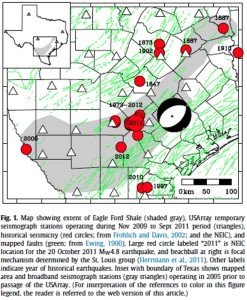The Texas Railroad Commission is publicly questioning scientific evidence that links fracking to earthquakes.
Last Friday scientists met with Railroad Commissioner Ryan Sitton and other officials for a technical discussion about the science behind a recent study that links fracking and earthquakes.
Related: Texas Earthquakes Linked to Fracking
The peer reviewed study led by researchers at SMU concluded that earthquakes in the north Texas communities of Azle and Reno were likely triggered by the wastewater disposal methods used by fracking companies. This common process is to inject the saltwater waste through high pressure methods deep into storage facilities underground.
During the meeting, SMU geophysics professor Heather DeShon reaffirmed the findings stating that "You only need a pressure change of 1.5 PSI to trigger an earthquake on a critically-stressed fault line,"
During the meeting, the scientists also asked Commissioner Ryan Sitton for a list of things that would be helpful for further studies including:
- Requiring disposal well operators to provide bottom hole measurements would be very helpful in their research.
- Getting saltwater disposal volume and pressure data on either a monthly or quarterly basis instead of yearly
“I have not reached the conclusion that oil and gas activity is the causal factor,” said Craig Pearson, the Railroad Commission’s staff seismologist. “While we remain concerned about seismic activity in the state, we still haven’t had a hearing where we’ve had a definite case made that a specific operator is associated with any specific earthquake activity.”



